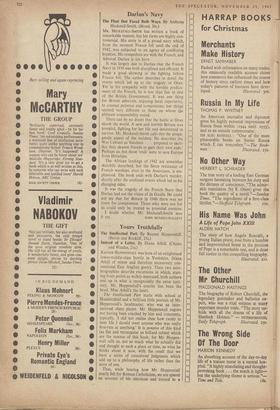Darlan's Navy
MR. HECKSTALL-SMITH has written a book of remarkable interest, but his views are highly con- troversial. His story is of a proud navy which, from the moment France fell until the end of 1942, was subjected to an agony of conflicting loyalties. His sympathies are with the French, and Admiral Darlan is his hero.
It was largely due to Darlan that the French Navy in 1939 was both disciplined and efficient. It made a good showing in the fighting before France fell. The author describes in detail the events which led up to the tragedy of Oran. Yet in his sympathy with the terrible predica- ment of the French, he is less than fair to that of the British Government. It was one thing for British admirals, enjoying local superiority, to counsel patience and compromise; but things seemed very different to those on whom the ultimate responsibility rested.
There can be no doubt that the battle at Oran shook the world. A new and terrible Britain was revealed, fighting for her life and determined to survive. Mr. Heckstall-Smith calls this the propa- ganda aspect of the incident. He describes the War Cabinet as 'butchers . . . prepared to sacri- lice their dearest friends to gain their own ends.' Perhaps so, but those `ends' were to save Europe from Hitlerism.
The African landings of 1942 are somewhat sketchily described, but the fierce resistance of French warships, even to the Americans, is em- phasised. The book ends with Darlan's murder, shortly after the confused events which led to his changing sides.
It was the tragedy of the French Navy that Darlan had not the vision of de Gaulle. He could not see that for Britain in 1940 there was no room for compromise. Those who were not for us could only be treated as potential enemies.
I doubt whether Mr. Heckstall-Smith sees






























































 Previous page
Previous page